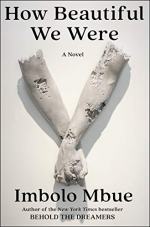|
This section contains 736 words (approx. 2 pages at 400 words per page) |

|
How Beautiful We Were Summary & Study Guide Description
How Beautiful We Were Summary & Study Guide includes comprehensive information and analysis to help you understand the book. This study guide contains the following sections:
This detailed literature summary also contains Quotes and a Free Quiz on How Beautiful We Were by Imbolo Mbue.
The following version of this book was used to create this guide: Mbue, Imbolo. How Beautiful We Were. Random House, 2021.
Mbue’s novel is divided into eleven chapters, alternating between the first-person collective point of view of “The Children” (the odd-numbered chapters) and first-person singular narrators who are all members of the Nangi family (Thula, Bongo, Sahel, Yaya, and Juba). The novel narrates events that take place between the years 1980 and 2020, and tracks the life of hero Thula Nangi from early childhood through her death around age 40. The primary conflict tracks the individual actions of Thula and the collective actions of the village of Kosawa to fight against the American oil company Pexton, whose exploitation of Kosawa’s land leads to total ecological and cultural destruction.
The inciting incident of the novel takes place when the Kosawa villagers kidnap the Pexton representatives and hold them hostage in the village. Tensions had been growing in the village for years as the increasing amounts of toxic waste left by Pexton began poisoning the water supply to the extent that children in the village began dying. These tensions boil over after elementary-aged Thula’s father Malabo goes to the city of Bézam to confront Pexton, along with five other men from the village, and never return.
The kidnapped Pexton representatives know much better than the villagers that there is no one in Bézam who will be willing to take up Kosawa’s cause and fight against the oil company, and thus the actions of the villagers are futile. To buy their freedom, the representatives connect Thula’s uncle Bongo, who has become the village leader, to a newspaperman in Bézam named Austin. When soldiers come in search of the Pexton representatives and massacre innocent villagers, Austin is there taking pictures, and the story of Kosawa’s plight gets published in the United States. In the end, Bongo and three other villagers are jailed without trial and ultimately hanged for the kidnapping.
The publication of the story brings Kosawa aid in the form of the Restoration Movement, which begins a lawsuit against Pexton and helps arrange for Thula and other village children to get a high school education in nearby city Lokunja and a college education in New York City. Thula’s spends almost ten years in the United States, becoming educated in various methods of social protest and nonviolent resistance. She reconnects with Austin and falls in love with him. While Thula is away, Thula’s mother Sahel makes the difficult decision to remarry despite the gender norms of the village prohibiting this.
Thula becomes increasingly disillusioned with the United States and with the efficacy of nonviolent protest, and with her encouragement a group of her male age-mates later referred to as the Five begin burning down Pexton buildings and holding up Pexton employees for money. Conditions worsen in the village and Thula’s mother Sahel moves to Bézam to be with her new husband after her mother-in-law, Thula’s grandmother Yaya, moves back to the village of her dead husband.
Thula returns to Kosawa, leaving Austin behind in order to pursue her mission, and eventually relents to the requests the Five make of her to give them enough money to buy guns. Thula begins a new legal case against Pexton and the Five begin murdering Pexton employees. With pressure from His Excellency’s government, as well as from Thula herself, the Five stop their guerrilla tactics, and Thula and the Five dedicate their lives to starting a grassroots political movement that would overthrow His Excellency’s government and install a democracy.
However, when the legal case against Pexton definitively fails, the Five crack and kidnap both Thula and the new Pexton representative. In the end, soldiers come and evacuate the village, and in the subsequent firefight Thula, the Five, the Pexton representative and his wife all die. His Excellency orders Kosawa burned to the ground, and Pexton begins a new drill in the space where the village’s town square used to be. A scholarship fund set up by Pexton in the name of the murdered representative pays for the next generation of Kosawa children to be educated and get high-paying government jobs. Thus, Pexton has won the battle against Kosawa not only by destroying the village itself, but also, more tragically, by destroying the traditional culture of the village.
Read more from the Study Guide
|
This section contains 736 words (approx. 2 pages at 400 words per page) |

|



